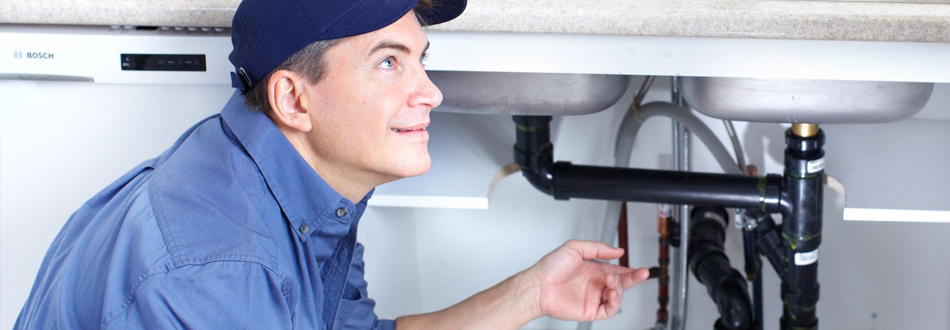
Sump Pump Repair
A sump pump is designed to help keep the underneath of building and home basements dry by collecting water in a “sump pit” and then pushing it out and away from the area. It is crucial to keep your sump pump maintained and ready in the event of flooding.
It is critical to have a yearly inspection for wear and tear as your sump pump plays a significant role in drainage. After the winter, when everything starts to thaw, the ground begins to saturate. By Spring it is raining more often, causing the ground to become completely saturated. This is the perfect time to inspect and/or replace your sump pump.
Backup Sump Pump. Aside from your regular sump pump, it is highly recommended that you also have a backup sump pump. A backup sump pump will kick in and save you thousands of dollars in water damage should your primary pump fail or a power outage occur, which is common during flooding rainstorms. Be sure to have your backup sump pump inspected as well.
Garbage Disposals
Garbage disposals make draining your sink an easy task. However, if not cared for properly, you'll find you will need to replace it sooner than later. Here are a few things you can do to keep your garbage disposal running longer:
- Never pull material out with your hand.
- Don’t try to grind things like rubber, metal, glass, or coffee grounds, bones, and overly-fibrous materials such as corn husks.
- Don’t put drain cleaners, bleach, or other chemicals down the unit.
- Always run water before and after using the disposal.
- Don’t overfill the garbage disposal.
- When you grind food, always use cold water. Hot water can melt fats that clog up.
For help with your garbage disposal, contact Miami Plumber today.
Septic System
Call on the experts at Miami Plumber if you need to replace, repair, maintain, or install your septic system, and get it done right. Our professional, courteous team of experts will fix the problem no matter how bad it is and are available 24 hours a day, seven days a week for emergency repairs.
We have septic system designs for almost every need including:
- Sites where the current system has failed
- High groundwater
- Bad soil – rocky, clay, sandy soils
- Steep sites
- Limited space
We will work with your contractor or architect on new installations to ensure that your septic system is built to last and more importantly, up to code. Call us today for an estimate on septic system replacement, repair, maintenance, or installation.
Gas Lines
One of the most common and affordable forms of energy used by residential consumers is natural gas. Although outstandingly efficient and relatively safe, consumers of natural gas should protect their homes and families better by being aware of possible hazards.
Gas Line Leaks. Though a rare occurrence, a leak in a Gas line can be extremely dangerous. When natural gas builds up in an enclosed area it can explode or at the least, make you ill. Equally as dangerous are gas leaks that happen outside the home. Homeowners should call their local utility company to identify and mark the gas lines before doing any job that requires digging outdoors.
Since natural gas was initially undetectable, a “rotten egg” odor was added to warn people of a possible leak. Please do the following if you smell this distinctive odor in your home:
- If a natural gas line is damaged when digging outside, call your local utility company immediately. Do not try to repair the gas line yourself.
- Do not attempt to locate the leak.
- NEVER smoke or use an open flame.
- Once you are at a safe distance, call 911 and the utility company.
- Do not use your cell phone until safely out of the house.
- Do not turn off or on any electrical appliances.
- Shut off gas valves at your home.
Prevent gas leaks in the home by having a licensed professional ensure flexible gas lines are properly installed and inspected. Contact Miami Plumber by calling 305-985-5138 today for gas line repair or to schedule an annual inspection.
Carbon Monoxide Poisoning. A by-product of using natural gas that is potentially harmful is carbon monoxide. This toxic gas can be very dangerous when inhaled. Unfortunately, carbon monoxide is completely colorless and odorless, making it almost impossible to detect on your own. If you are experiencing headaches and dizziness or flu-like symptoms and have been exposed to carbon monoxide, get out of your house and call 911 immediately.
Tips to reduce the chances of carbon monoxide poisoning:
- Never heat your home with a gas oven.
- Install carbon monoxide detectors in various areas of your house.
- Do not sleep in a room heated by a kerosene or gas space heater without proper venting.
- Inspect the chimneys, flues, and vents of all gas fireplaces, furnaces, and water heaters for proper ventilation of exhaust.
Pipes
In homes built before 1970, galvanized iron pipes were commonly installed. To prevent rusting, they were often covered with a protective layer of zinc which, over the years, erodes as the pipe walls begin to corrode. Typical signs of corrosion are damage to water-using appliances, a brownish tint in bath or sink water, and drops in water pressure.
Copper pipes can cause just as many problems as galvanized iron. Corrosive water combined with low-quality copper allows for a pinhole leakage that may take a while to detect. Signs of corrosion include water discoloration, reduced water pressure and flow, and damp spots in your drywall and flooring.
To improve the pressure of the water in your home and avoid a costly leak, any pipes that are corroded should be replaced immediately. Our experienced plumbers will remove the bad pipes, dispose of them properly, and install new pipes likely made with PEX, CPVC, copper pipe.
Contact Miami Plumbing by calling 305-985-5138 today for pipe repair or replacement, or to schedule an annual inspection.
Washer Hoses
One of the leading causes of home insurance claims is water damage caused by a washer hose malfunction. If the washer hose is failing it could cause a flood resulting in costly damage to your home.
Check Your Washing Machine Hose. Inspecting your washer hoses prevents unexpected damage from happening and is relatively simple to do. When checking your hoses, look for cracks, bulges, or leaks. To prevent hose kinking and damage always keep your washing machine at least four inches away from the wall.
You should always be home when your washing machine is running. You should also know where the machine’s shut-off valves are located. This way, if a hose bursts, you can prevent extreme damage by quickly shutting the water off.
Replace Your Washer Hoses. Your hoses have likely aged after about 3 years. If upon inspection you find any cracks, bulges, or leaks, you should replace your hoses immediately. Traditional rubber hoses leak and quickly deteriorate so stainless steel is a better alternative when purchasing new washer hoses.
Contact your Miami Plumber specialists by calling 305-985-5138 today to replace your hoses or to schedule an inspection.
Leaks & Drips
Did you know that dripping faucet can quickly rust your fixtures and stain your sink? Not to mention, a faucet that drips 5 times a minute wastes approximately 230 gallons of water a year. So though a leaky faucet doesn’t seem like a plumbing emergency, it absolutely can be.
Miami Plumber will repair or replaces all types of faucets and fixtures. Call a Miami Plumber specialist today to get your leak fixed quickly.
Water Heaters
Most people don’t ever think to schedule a water heater check-up unless they experience a few cold showers or a leak. As a matter of fact, there are even some that wait so long to service their water heaters that they risk using up way more energy than necessary and even worse, damaging the tank.
Sediments can build up in the tank over time, causing your water heater to eventually overheat. A plumbing specialist from Miami Plumber can remove these sediments and, if necessary, drain the tank.
If you notice rust or metal in your tank’s water, call Miami Plumber at 305-985-5138 immediately. These particles may indicate the anode rod needs to be replaced. The anode rod draws the chemicals from the water to keep the tank liner from rusting away.
Oftentimes, if your home is experiencing water damage to floors, ceilings, or walls, it could be due to an incorrectly installed drain pan under your water heater.
Caution: Turn off the power at your circuit breaker or shut off the gas before making any kind of water heater inspection.
Replace or Just Repair? Before you decide whether to fix your old water heater or buy a new one, there are a couple of things to consider. Always remember never to spend more than half of the cost of a new heater if you’re considering simply repairing your old unit. Is your residential unit out of warranty? If so, replacement could be the most efficient option. The cost savings from a new unit might outweigh the cost to repair the lack of performance from an old water heater.
Miami Plumber provides 24/7 water heater repair and replacement services, including high-efficiency and tankless models. We use name brands to provide you with quality water heating service for your residential or commercial water heater needs.
If you are experiencing a water heater leak or emergency, contact a Miami Plumber plumbing specialist by calling 305-985-5138 immediately.
